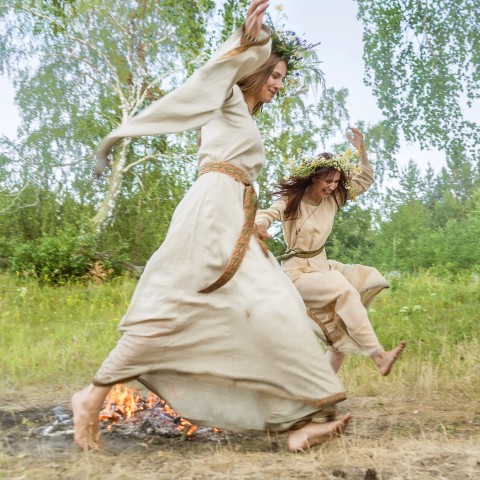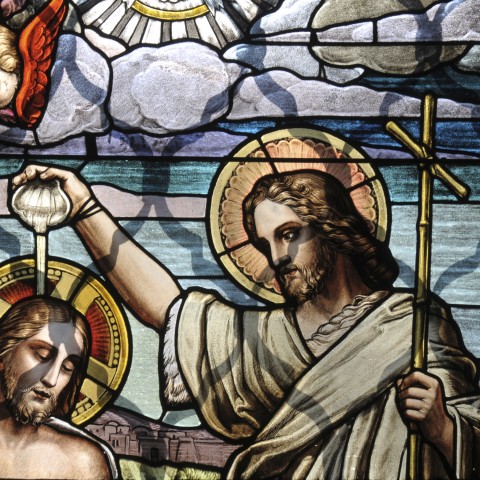One of the most ancient and important Slavic holidays in Russia is the holiday of Ivan Kupala, celebrated since the twelfth century. Essentially, this day is held in commemoration of St. John the Baptist, though Russians also celebrate through more pagan events.
In learning about the Ivan Kupala Day holiday in Russia, you’re opening yourself up to some unique facets of Russian culture. And as any successful language-learner can tell you, knowing a country’s culture is vital in mastering its language.
At RussianPod101.com, we hope to make this learning journey both fun and informative! So let’s get started and delve into Ivan Kupala Night, and the following Ivan Kupala Day, in Russia!
1. What is Ivan Kupala’s Day?
In ancient times, people observed the holiday of Ivan Kupala on the day of the summer solstice (June 20-22). Once Russia adopted Christianity, people linked the celebration to John the Baptist’s birthday on June 24 (old style) or July 7 (new style).
Nobody really knows where the holiday got its name. Some connect it to the Pagan god Kupala, while others say it comes from the Slavic version of St. John the Baptist’s name.
2. When is Ivan Kupala Day?
Each year, Ivan Kupala’s Day is celebrated on July 7 in Russia, beginning on the evening of July 6.
3. Reading Practice: How is Ivan Kupala Day Celebrated?
How do the Russians celebrate Kupala Night and Ivan Kupala Day? Read the Russian text below to learn about Ivan Kupala festival traditions, old and current. You can find the English translation directly below it.
—
Русский народ ассоциирует три главных символа с Днем Ивана Купалы- – огонь, вода и трава. Таким образом, многие традиции и верования относительно этого праздника имеют отношение к этим трем вещам.
Одной из таких традиций является традиция костра. Русский народ будет строить большой костер и прыгать через него, так как это, как полагают, лечебные силы в эту ночь. Кроме того, в старые времена люди сжигали одежду больных людей в надежде, что они выздоровеют быстрее. Для того, чтобы это сработало, люди думали, что огонь должен быть сделан путем потирания вместе сухих палочек.
В День Ивана Купалы девицы плели венки из цветов с поля и отпускали их вечером, чтобы поплавать на озере или поверхности реки. Затем они наблюдали венок. Если венок застрял вдоль берега, его владелец не женится в этом году; если он скорее затонул, это считалось плохим предзнаменованием. Чем дальше венок плыл с берега, и чем дольше он фактически оставался на плаву, тем счастливее судьба девицы в конечном итоге.
Еще одно интересное убеждение, связанное с этим праздником в древние времена? Люди верили, что накануне Ивана Купалы оживают деревья и растения, разговариваются друг с другом и даже перемещаются по лесу.
—
The Russian people associate three main symbols with Ivan Kupala Day: fire, water, and grass. Thus, many traditions and beliefs regarding this holiday have to do with these three things.
One such tradition is that of the bonfire. The Russian people will build a large bonfire and jump over it, as this is thought to have curative powers on this night. Further, in the old times, people burned the clothing of sick people in hopes that they would recover faster. In order for this to work, people thought that the fire must be made by rubbing together dry sticks.
On Ivan Kupala Day, maidens wove wreaths made of flowers from a field, and let them go in the evening to float on a lake or river’s surface. They then observed the wreath. If the wreath got stuck along the shore, its owner would not get married that year; if it rather sunk, this was considered a bad omen. The further the wreath floated from the shore, and the longer it actually stayed afloat, the happier the maiden girl’s fate would end up being.
Another interesting belief associated with this holiday in ancient times? People believed that on the eve of Ivan Kupala, trees and plants came to life, talked with each other, and even moved around the forest.
4. The Symbolic Plant of Ivan Kupala’s Day
Do you know which plant is the symbol of Ivan Kupala Day?
Since ancient times, the symbol of Ivan Kupala Day is the fern. There’s a legend associated with fern flower, which blooms only one time during the year: Ivan Kupala Night. Whoever finds this fern flower will be gifted with many useful and interesting abilities:
- Understanding bird and animal language
- Seeing into the future
- Becoming invisible
- Finding buried treasure easily
Who wouldn’t want at least one of these abilities?!
5. Vocabulary You Should Know for Ivan Kupala Day
Here’s some vocabulary you should know for Ivan Kupala’s Day in Russia!
- Вода (voda) — “water”
- Июль (iyul‘) — “July”
- Плавание (plavaniye) — “swimming”
- Растение (rasteniye) — “plant”
- Огонь (agon`) — “fire”
- Папоротник (paporotnik) — “fern”
- День Ивана Купалы (Den’ Ivana Kupaly) — “Ivan Kupala’s Day”
- Гадание (gadaniye) — “divination”
- плетение венков (pleteniye venkof) — “weave wreaths“
- командная игра (kamandnaya igra) — “team game”
- прыгать через костёр (prygat’ cheres kastyor) — “jump over the bonfire”
- 7 июля (7 iyulya) — “July 7th”
- Иоан Креститель (Ioan Krestitel’) — “John the Baptist”
- Костер (kastyor) — “bonfire”
To hear each vocabulary word pronounced, check out our Ivan Kupala’s Day vocabulary list.
Conclusion
What do you think of the Kupala Night Russia observes each year? Which of the beliefs associated with it do you find most interesting? Let us know in the comments!
To continue learning about Russian culture and the language, keep exploring RussianPod101.com! We provide fun and practical learning tools for every learner, including free Russian vocabulary lists and more insightful blog posts like this one! We also have an online forum where you can talk with fellow Russian learners or reach out for help!
To take even more control over your Russian learning, upgrade to Premium Plus! With a Premium Plus account, you can take advantage of our MyTeacher program, and learn Russian one-on-one with your own teacher!
Know that your hard work will pay off, and you’ll be speaking, reading, and writing Russian like a native before you know it! And RussianPod101.com will be here with you on each step of your journey to language mastery.













